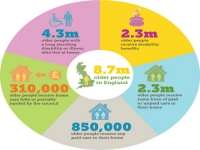Community Care Report
Thursday 27 November, 2014 Written by Mithran Samuel Independant Age - Community Care
Independant Age - Community Care
70,000 older people in significant need go without paid or unpaid care, new study finds.
An additional 160,000 pensioners report receiving inadequate care and 380,000 older carers receive no local authority support, finds report by Independent Age and the Strategic Society Centre
Seventy thousand older people with significant needs in England are receiving no paid or unpaid care, while a further 160,000 report receiving inadequate care, a study published today has found.Among older carers, an estimated 380,000 providing over 50 hours a week of care are not receiving any support from their local authority, said the report published by Independent Age and think tank the Strategic Society Centre.
The study, written by the centre’s director, James Lloyd, used data from the English Longitudinal Study of Ageing (ELSA) to estimate that there were two million older people living at home who had difficulty with at least one activity of daily living (ADL), such as dressing or using the toilet. Of these, 560,000 had difficulties with three or more ADLs, suggesting they would have a ‘substantial’ need for care under the Fair Access to Care Services criteria.But analysis of the ELSA data found that 12% of these – about 70,000 – received no care at all, whether paid or unpaid, representing “significant unmet need”.
The ELSA data also revealed there were 2.3m older people received some form of care at home, but 6.9% felt this care “sometimes or hardly ever met their needs”, representing 160,000 people.Further data from the 2011 Census revealed that 458,010 older people provided over 50 hours a week of unpaid care, however just 80,000 received local authority support in 2011-12, according to official figures, meaning 380,000 went without.
As well as highlighting estimated levels of unmet need, the report also argued that councils needed to engage with a much bigger group of older people in implementing their new duties under the Care Act 2014 to provide information and advice and preventive services.It said this encompassed the 4 million older people – as recorded by the 2011 Census – living at home with a longstanding health condition or disability, only 570,000 of whom were recorded as receiving local authority community services in 2011-12.
The report, entitled The Bigger Picture, said reaching out to this group should involve using GP surgeries and Department for Work and Pensions (DWP) disability benefits assessors, both of which had contact with a much larger number of disabled people than councils.
This could involve the partial integration of assessments for attendance allowance (AA) and care and support, so that information gathered through AA assessments could be passed to councils.It also called on councils to build capacity in local voluntary organisations that provided information and advice to older people, enabling them to take referrals directly from GPs or the DWP.
Leave a comment
Make sure you enter all the required information, indicated by an asterisk (*). HTML code is not allowed.
Join
FREE
Here










